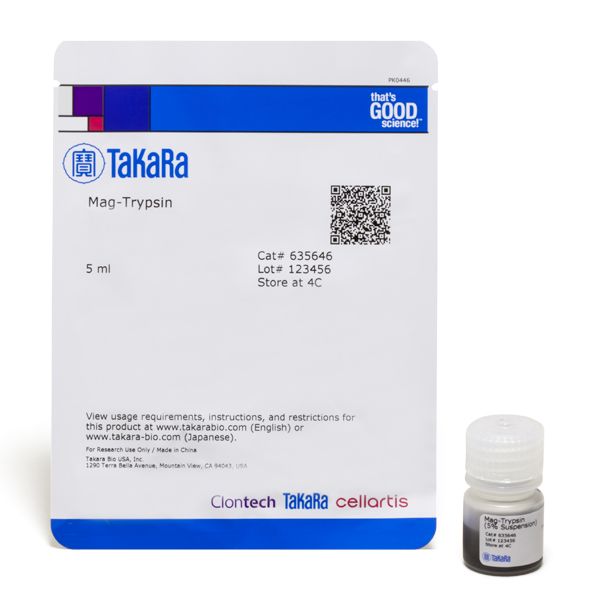Mag-Trypsin
Mag-Trypsin consists of trypsin treated with TPCK (L-1-tosylamido-2-phenylethyl chloromethyl ketone) to inhibit chymotrypsin activity, then immobilized on magnetic beads. The immobilized enzyme is easily removed from the reaction mixture after a digestion reaction by using a magnetic separator. The resulting peptides may then be analyzed using techniques that require trypsin removal following digestion, such as mass spectrometry.
Overview
- MS-grade trypsin (TPCK-trypsin) immobilized on magnetic beads for effective trypsin digestion
- Use of TPCK-trypsin shows no chymotryptic and minimal autolytic activity
- Final peptide mixture is free of trypsin contamination (trypsin is removed in one step)
- No centrifugation required
Applications
- Trypsin digestion of protein mixtures
- Mass spectrometry analysis of trypsin-generated peptides
- Protein sequencing—preparing tryptic fragments for Edman degradation sequencing
- Preparing antibody fragments—obtain 2 Fab fragments and 1 Fc fragment per antibody molecule (unlike pepsin, which cannot easily digest F(ab')2 fragments)
Magnetic Stand for 1.5-ml microcentrifuge tubes

Magnetic Stand for 1.5-ml microcentrifuge tubes (Cat. # 631964). Use with magnetic beads for protein purification, immunoprecipitation, co-immunoprecipitation, and cell-capture studies.
Protein digestion protocol using immobilized magnetic trypsin

Protein digestion protocol using immobilized magnetic trypsin. Proteins digested from immobilized magnetic TPCK Trypsin are ready to be used for mass spec applications.
HPLC analysis of beta-casein digested with Mag-Trypsin

HPLC analysis of beta-casein digested with Mag-Trypsin. Denatured beta-casein protein was digested with TPCK-trypsin immobilized on magnetic beads. Reverse phase HPLC (RP-HPLC) data is shown for undigested beta-casein (Panel A) and digested beta-casein (Panel B). Denaturation was carried out by dissolving 1 mg of protein in 100 µl of 0.1 M sodium carbonate, pH 8.3, and 8 M urea; and mixing at room temperature for 2–6 hr. The denatured protein was then diluted to 1 ml to reduce the urea concentration to <1 M. Then 1 ml of immobilized trypsin was washed with water and incubated with the protein with vigorous mixing at 37°C overnight. (The enzyme-to-substrate ratio and incubation time may need to be optimized for a specific application.) RP-HPLC analysis was performed on a Waters Breeze HPLC, XTerra RP18 column (5 m, 4.6 x 150 mm) with UV detection at 215 nm (Solvent A: 0.1% TFA in water [v/v], Solvent B: 0.1% TFA in acetonitrile [v/v]).


